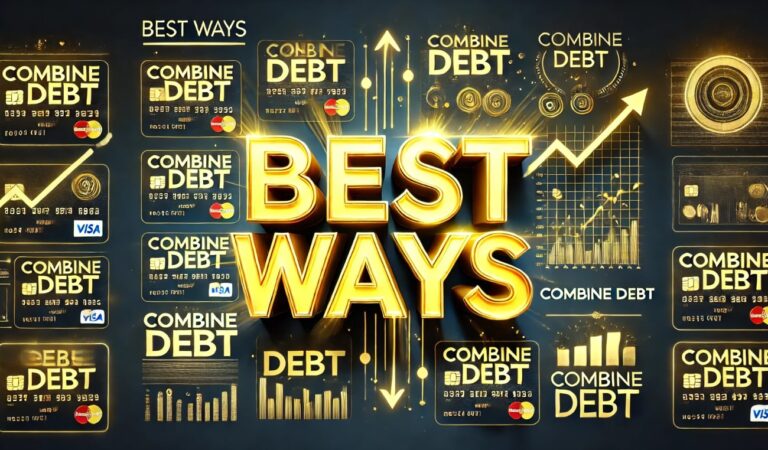Consolidating debt is a strategic way to manage multiple debts and potentially reduce overall interest costs. Here are some of the best methods to consolidate debt, backed by expert opinions.
1. Debt Consolidation Loan
A debt consolidation loan involves taking out a new loan to pay off multiple high-interest debts. This can simplify payments and potentially reduce the interest rate.
Expert Insight: Liz Weston, a personal finance expert at NerdWallet, suggests, “A debt consolidation loan can help you streamline your payments, reduce your interest rates, and pay off your debt faster.”
Liz Weston is highlighting the benefits of a debt consolidation loan, such as making a single monthly payment instead of juggling multiple payments. By securing a lower interest rate through the loan, you can save money on interest and potentially pay off your debt more quickly.
How It Works:
- Apply for a debt consolidation loan from a bank or credit union.
- Use the loan to pay off existing debts.
- Make one monthly payment towards the new loan.
Pros:
- Simplified monthly payments.
- Potentially lower interest rates.
- Fixed repayment schedule.
Cons:
- Requires good credit to secure the best rates.
- Fees and closing costs may apply.
2. Balance Transfer Credit Card
Using a balance transfer credit card with a low or 0% introductory interest rate can help consolidate credit card debt and reduce interest costs.
Expert Insight: Beverly Harzog, a credit card expert at U.S. News & World Report, states, “Balance transfer cards can be a great way to save on interest and pay down your debt faster if you qualify for one with a good promotional rate.”
Beverly Harzog emphasizes that balance transfer credit cards can be beneficial if you can qualify for one with an attractive introductory rate. This allows you to move high-interest debt to a card with little to no interest for a certain period, helping you save on interest and pay off the balance faster.
How It Works:
- Apply for a balance transfer credit card with a low or 0% introductory APR.
- Transfer existing credit card balances to the new card.
- Pay off the balance during the introductory period to avoid high interest rates.
Pros:
- Potential for zero or low interest during the introductory period.
- Consolidates multiple credit card payments into one.
Cons:
- Balance transfer fees may apply.
- High interest rates after the promotional period ends.
Top Bonus Credit Card Offers in 2024 for US with $200 Cash Reward Bonus.

3. Home Equity Loan or Line of Credit (HELOC)
A home equity loan or HELOC can be used to consolidate debt, offering potentially lower interest rates compared to other loans.
Expert Insight: David Weliver, the founder of Money Under 30, advises, “Using home equity to consolidate debt can be a smart move if you have equity in your home and can secure a lower interest rate. However, it’s crucial to be disciplined with repayment as your home is at risk.”
David Weliver points out that using your home’s equity can provide a low-interest loan for debt consolidation. However, it’s essential to be cautious because your home is collateral. Failing to repay the loan could result in losing your home, so disciplined repayment is vital.
How It Works:
- Borrow against the equity in your home through a home equity loan or HELOC.
- Use the funds to pay off existing debts.
- Make monthly payments on the home equity loan or HELOC.
Pros:
- Lower interest rates compared to unsecured loans.
- Potential tax benefits on interest payments.
Cons:
- Your home is used as collateral.
- Risk of foreclosure if payments are not made.
4. Debt Management Plan (DMP)
A debt management plan through a credit counseling agency can consolidate your debt payments into one monthly payment and negotiate lower interest rates with creditors.
Expert Insight: Bruce McClary, a spokesperson for the National Foundation for Credit Counseling, explains, “A debt management plan can help you regain control over your finances by consolidating payments and potentially reducing interest rates, though it’s essential to choose a reputable credit counseling agency.”
Bruce McClary explains that a debt management plan can simplify your finances by consolidating multiple payments into one and potentially lowering interest rates. However, he stresses the importance of working with a reputable credit counseling agency to ensure the plan is effective and beneficial.
How It Works:
- Work with a credit counseling agency to create a DMP.
- The agency negotiates with creditors to lower interest rates and fees.
- Make one monthly payment to the agency, which distributes the funds to creditors.
Pros:
- Lower interest rates and waived fees.
- Single monthly payment.
- Professional guidance and support.
Cons:
- May require closing credit card accounts.
- Potential impact on credit score.
5. Personal Loan
A personal loan can be used for debt consolidation, offering a fixed interest rate and fixed repayment term.
Expert Insight: Greg McBride, Chief Financial Analyst at Bankrate, says, “Personal loans can be a viable option for debt consolidation if you can secure a lower interest rate than your current debts. It also helps to have a clear repayment plan.”
Greg McBride indicates that personal loans can be advantageous for debt consolidation if the interest rate is lower than your existing debts. A clear repayment plan ensures you can manage the loan effectively and pay off your debts systematically.
How It Works:
- Apply for a personal loan from a bank or online lender.
- Use the loan to pay off existing debts.
- Make fixed monthly payments on the personal loan.
Pros:
- Fixed interest rates and repayment terms.
- Can be used to consolidate various types of debt.
Cons:
- Interest rates depend on creditworthiness.
- Fees may apply.
6. Debt Settlement
Debt settlement involves negotiating with creditors to reduce the total amount owed in exchange for a lump sum payment.
Expert Insight: Ruth Susswein, Deputy Director of National Priorities at Consumer Action, cautions, “While debt settlement can reduce the amount owed, it comes with risks, including damage to your credit score and potential tax liabilities.”
Ruth Susswein warns that although debt settlement can lower the amount you owe, it can also negatively impact your credit score. Additionally, the forgiven debt may be considered taxable income, leading to unexpected tax liabilities.
How It Works:
- Work with a debt settlement company or negotiate directly with creditors.
- Offer a lump sum payment that is less than the total amount owed.
- If accepted, pay the settled amount and resolve the debt.
Pros:
- Can significantly reduce the amount of debt.
- Avoids bankruptcy.
Cons:
- Negative impact on credit score.
- Potential tax liabilities on forgiven debt.
- Fees charged by debt settlement companies.
Conclusion
Each debt consolidation method has its benefits and drawbacks. It’s important to consider factors such as interest rates, fees, and potential impact on your credit score. Consulting with a financial advisor can help determine the best strategy for your specific situation.
These references and detailed insights from financial experts can guide you towards making informed decisions about consolidating your debt.
Remember, the goal is to simplify your payments and reduce your overall debt burden, so choose the method that best aligns with your financial circumstances and goals.



